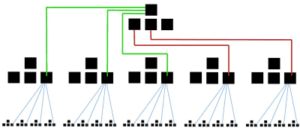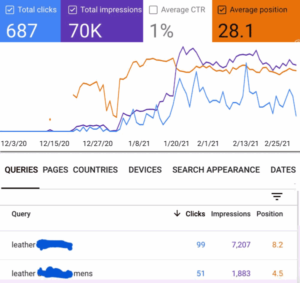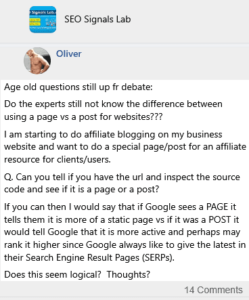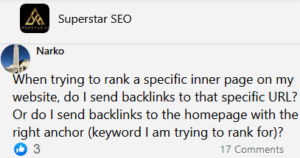Chris
How do you write "SEO Optimized Content"?
📰👈
28 👍🏽 28 63 💬🗨
This is just another approach I'm using:
CONTENT INSTALL SOP
Use site title as recommended for URL
Identify proper URL structure for the post/page/press release etc
Install META
Correctly link all SUMMARY links
Summary is H4
Proper H1 that matches site title
H2 use as suggested in content
2 internal links per page
1 external link per page using long tail keyword to relate to site title to an authority link with relevance
Form/Call-To-Action (CTA) on every page at least 2x
ALL IN ONE SEO green
Make sure author is proper – Post date or schedule posts, NO POST DUMPS – consistency is key for RANKING
Author must not be installer name, should be nicknamed key focus keyword
Use categories and tags as much as possible
Make sure 1-2 photo has alt text with key focus keyword
Make sure page has been SEO for a focus keyword in AlOSEO -otherwise the page really isn't SEOed
Use 1 bold phrase, 1 italic phrase
Use h4 heading at bottom of article in long tail keyword phrase
Make sure the images used as call to action, are named related to the page link. Add ALT name also. Link the image.
What is advantage of h4 heading
Chavez
You gotta test yourself to see the advantage.
Melvin » Chavez
Other than the H4, pretty much what I do. Very generous of you sharing it.
Yawer
Find a topic with primary and secondary keywords .. place primary keyword in Mt, MD, and H1.. use secondary keywords in h2 and use 1% of all keywords with division of primary and secondary keywords within the content according to word count.. use proper alt tags..
💟👍🏽3
Ouarain
I think the best way to write SEO optimized content is to analyze the results of the first page of Google for that specific keyword. See what they have in common : search intent, structure, length, level of optimization, etc. You then try to do something similar but better, more in depth, more qualitative. The basics remain the same though ( keyword in URL, Title Tag, H1 and in content). Secondary keywords in H2 and H3 headings … descriptive anchor texts and img alt tags
And this is why SEO users love the tool Page Optimizer Pro or POP
Ouarain » Keith L Evans
Heard good things about it, there is also Surfer SEO I guess they kinda do the same thing : SERP analysis
Nick
URL = main keyword
Meta = Main keyword + clickbait
H1 = Main keyword + something clever
H2s = 40 – 60% contain variation of main keyword
Swap out out main keyword in-content for variations of main-keyword.
This process enables an editing team that doesn't know SEO to do SEO optimizations
💟👍🏽33
My approach is closely related to yours
💟1
Nick » Keith L Evans
This is the way! Way easier to give non-SEO editors / writers instructions to follow then hiring SEO users to do content work
Noman
Perfect
💟1
Cory
SEO = search engine optimization
SEO Optimized = search engine optimization optimized
👍🏽🤭9
Bokhan
Here's a workflow you can start with (it's neither very simple, nor quick, but you'll find it more effective than inserting random keywords in your site's pages):
1. Define your SEO goals
2. Identify your target audience
3. Analyze competitors to understand where you are
4. Research topics and keywords
5. Map keywords to your customer journey stages
6. Map keywords to landing pages and goals
7. Group keywords to your content structure
8. Create an editorial calendar
9. Plan outreach activities to get links and mentions
10. Track your SEO Key Performance Indicators (KPI)s
11. Update and repackage content
If interested in details, you can check this article: https://www.link-assistant.com/news/SEO-content-plan.html 🙂
Create an SEO Content Plan to Help Your Business (+ Free Templates)
🤔💟👍🏽8
Rajesh
I generally follow what Nick has said from title and headers perspective. I will also add relevant images and describe them appropriately in alt tags and image file names.
I also embed videos, if relevant. Then I do this for the main content
I use a proprietary Natural Language Processing (NLP) analyser that uses Google's NLP API to carry out the following:
1) Get all the contextual phrases/terms in which all the relevant Entities, as identified by Google's NLP API, were used in competitor's content.
2) Use those terms/phrases (along with the Entities) in the content. This is to make sure that all relevant co-occurring phrases/terms are adequately covered in the content
3) The trick to use Entities is one shouldn't go deep into what one considers as Entities. The salience scores output by the tool helps in determining the Entities that I definitely want to use.
4) And finally ensure that the content is written naturally covering all the co-occurring phrases/terms (along with the Entities) that the tool had identified from competitor's content.
Kolade
First identify searcher's intent from the top ten results on the SERP for that keyword.
Pay attention to other suggested keywords and copy them into a Google Docs(they'd be useful in your H3)
Also pay attention to length, tone and aim to write deeper and concise version of what is ranking on the first page of the Search Engine Result Page (SERP).
Use keyword in H1 title
Let your first paragraph fulfill the requirements of your searcher's intent.
Insert keyword within first paragraph
Use keyword variations in H2 title
Insert keyword in Meta Desc with click-bait caption
Insert Keyword in Image Alt Tag.
📰👈
Allintitle Keyword Golden Ratio (KGR)
Why Keywords are Important in SEO Content!
How to Improve Organic Keyword Quality to Increase Rank?
Twin Graphs of Organic Traffic and Keywords and the SEO Strategy
Use Latent Semantic Indexing (LSI) Keywords to Boost Your Website Organic Traffic
Thoughts on Leaving a Keyword out of an H1, H2, and the Meta Description
How do some Tools Calculate the Keyword Difficulty? Which One is Relatively more Reliable? SEMrush|Ubersuggest|Kwfinder
Unique Keyword Research
4 Common Mistakes I See People Make in Doing Keyword Research for SEO







